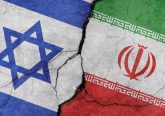 In the last few weeks, there has been a flood of articles asking and seeking to answer, ‘What is Iran thinking?’. It is an important question and I certainly don’t have an answer. But to try and understand Iran’s motives, we need to put its actions in the social and political context of the norms of the current non-proliferation ‘regime’ and the nuclear reality of today’s world. The media discourse on Iran and nukes should bring to the forefront an old but significant question about the relevance (or rather the irrelevance) of nuclear weapons and the failings of the non-prolifeation regime.
In the last few weeks, there has been a flood of articles asking and seeking to answer, ‘What is Iran thinking?’. It is an important question and I certainly don’t have an answer. But to try and understand Iran’s motives, we need to put its actions in the social and political context of the norms of the current non-proliferation ‘regime’ and the nuclear reality of today’s world. The media discourse on Iran and nukes should bring to the forefront an old but significant question about the relevance (or rather the irrelevance) of nuclear weapons and the failings of the non-prolifeation regime.
This are not new queries. But as much as it sounds like old wine in a new bottle, we can take the current Iran-centred debate (just) a little further and remind ourselves that the danger is in the weapons themselves, not in who holds them. This questions the legitimacy given to nuclear weapons by military leaders as important ‘deterrents’ and counters the widespread belief that, as Richard Price states, ‘ nuclear weapons don’t kill, rogues do’. These dimensions need as much attention as the main agenda to prevent Iran from acquiring nuclear weapons.
There are three main problems with the ongoing debate: i) the focus on the ‘actor’ more than the problem of nuclear weapons themselves; ii) a misunderstanding of rationality within the current debate; and iii) the lack of focus on the framework of the non-proliferation regime and how it might affect state behaviour.
I’ll look at each of these in turn.
First is the actor/weapon debate. The weapons should be the primary concern. Of course one might argue that non-proliferation is always an underlying motive, but I believe it should be the overt and primary motive of the West’s Iran policies. The current debate tends to remove the focus from nuclear weapons themselves as the referent of threat and transfers it to particular potential possessors and users of the threat. This contradicts the very foundation of the non-proliteration argument, with the Non-proliferation Treaty (NPT) at its core, which regards nukes as non-conventional weapons and thus inherently illegitimate.
Then there is the second point, the question of ‘rationality’, which I argue has been limited to merely explaining what kind of behaviour is, and should be, termed ‘rational’. Few have acknowledged an alternate understanding (Fareed Zakaria being one exception) which argues that Iran is acting rationally, calculating costs and benefits, but not necessarily doing so with the same goals or values as other actors. In order to understand the rationality of nation states and to ultimately deal with the problem of nuclear proliferation, we need to understand rationality beyond a cost-benefit calculation and combine it with a cultural approach that emphasises established and familiar patterns of behaviour. In this sense, we need to understand Iran’s interpretation of the nuclear regime and its norms. Sending the message that Iran should be prevented from developing weapons because it cannot handle them ‘responsibly’ has in many ways pushed Iran to justify and prove why it can do so. The alternative to this approach is the US – India nuclear deal in 2005, which (after 30 years) labelled the latter as a ‘responsible nuclear power’, now allowing for a much greater degree of transparency.
My third and final point seeks to draw attention to the normative looseness of the non-proliferation structure, which was formed to prevent nuclear proliferation and promote nuclear disarmament. The norms within the non-proliferation stance and the ‘rhetoric of peaceful use’ have been used, interpreted and manipulated by Iran in a similar way as New Delhi did in the past, exploiting loopholes in the nuclear normative structure. The potential threat posed by Iran’s claimed peaceful nuclear programme (going anything over 20% uranium enrichment, defined as the ‘Red Line’ by the Obama administration), should also be understood in the context of the unintended consequences of the norms and rules (of the regime itself) and the ways in which nations both ‘good’ and ‘rogue’, ‘rational’ and ‘irrational’ have come to define their own rights and obligations within a nuclear regime. As a NPT-member, Iran has claimed that its nuclear programme is consistent with Article IV (peaceful use) and has denied any military dimension to its nuclear programme. Given this, Iran has further claimed that it is being discriminated against and as a NPT member it has an ‘inalienable right’ to engage in peaceful use of nuclear technology.
Recently, Iran has sought to open talks and has expressed a willingness to renegotiate, but only if the IAEA agrees to a revised and a new approach to Iran’s programme. In many ways, Iran is doing what India did; the difference being that Iran is viewed as irrational and rogue, whereas India was considered responsible and rational. I’m not suggesting that they should be treated the same. But it is interesting to note that Tehran is making attempts to acquire legitimacy in a similar ways to New Delhi. If one is to think ‘rationally’ in building a nuclear programme, one must first attempt to acquire the technical know-how, then demonstrate it by testing it (or at least creating enough suspicion about testing it) and once the international community ‘recognises’ one’s capability of developing a sufficient deterrent then negotiations can begin. The approach is to ‘sit on the table with a nuke in the backyard’ (or at least possess the capability to develop it).
Thus we should stop playing the same NPT game, knowing that it is flawed. The belief that Iran is moving towards a sufficient capacity of building that nuclear deterrent (identified as anything above 20% and close to reaching 90% enrichment), has to be put in context of reality — all the main players, be it US or Israel, already possess a nuclear deterrent. And ironically, Iran is a NPT signatory (and therefore is seen in violation of it), unlike Israel or India, two of the three nations with nuclear capabilities that have never signed the NPT and continue to remain outside it (Pakistan being the third).
This is not a defence of Iran’s nuclear posture, nor is it about judging Iran’s good or bad intention, but it is about employing the kind of understanding one needs to have in ‘dealing with’ Iran today and any other nation tomorrow. There must be a broader discussion of the rationality behind nuclear weapons, not just on who should have them and how they should be used. Moreover, ‘rationality’ must be understood more broadly. overall, Iran’s actions question the deterrent value of nuclear capabilities — if anything, it makes others that much more desperate to join the club.
Deepshikha Kumari is a DPhil student at Oxford University.




7 Comments
Iran has NOT EVER violated the NPT. According to the explicit text of Iran’s (standard) safeguards agreement with the IAEA, the “exclusive function” of IAEA inspectors is to ensure the non-diversion of nuclear material to non-peaceful uses. The IAEA has verified that all of Iran’s nuclear material is accounted-for, and not diverted. Thus, Iran has not violated the NPT. The demand that Iran give up enrichment, since it “could be” used to make bombs at some indefinite point in the future, is itself a violation of the NPT.
In any case, the current US-Iran stand off is not really about nukes. That’s just a pretext and convenient excuse for a policy of regime change, just as “WMDs in Iraq” were a pretext. In reality, no amount of Iranian nuclear compromises will ever satify the US since the US’s real goal is to topple the regime in Iran. The last thing the US wants is to allow this dispute to be resolved, with the regime still in power.
Iran’s nuclear row with America should also be seen in the context of post-1979 US-Iranian relationship as well as the decisive influence that the Israeli lobby has on US foreign policy. The US wants to settle scores with Iran that go as far back as the kidnapping of the entire staff of the US embassy for 444 days after the 1979 revolution. And acquisition of nuclear weaponry by Iran would end Israel’s nuclear monopoly in the Middle East. Beyond that, insofar as the stand that IAEA has taken on the Iranian nuclear issue, there are other factors. For the nuclear pursuits of Iran worry not just Israel and America but also all of Iran’s Arab neighbours in the Persian Gulf, who are also close US allies. Iran is considered a nuclear suspect particularly because it is rich in energy and is a signatory of the NPT. Iran’s consistent defiance of the IAEA means its leadership considers peaceful nuclear energy an issue of national survival, which should not be the case for a country that does not need the nuclear alternative as such. In sum, however, I agree with the thesis in the above article about analysing the subject within a broader social and political framework, especially the issue of rationality of nuclear weapons and discriminatory nature of the non-proliferation regime.
The three main points 1) Who handles nuclear weapons 2) How do you define rational actors that goes beyond the cost benefit analysis to include their cultural context 3) Loose NPT framework are nicely interlinked to explain that its not just about if Iran has a weapon, but what does it means in the day and age when there is a growing concern that certain state actors are ‘perceived’ to be a threat by the international community. More importantly, the inability of the existing NPT framework to address this loophole in such an issue. With this in mind, the key point to understand is not only upholding an existing normative culture that differentiates between state actors but where does soveriegnty play in this debate. Good job….very applicable to an issues that needs more awareness
I think you have raised a very fundamental, and yet often forgotten issue regarding the rationality of nuclear weapons itself. The bad boy politics and arm wrestling surrounding it does manage to drown this basic question. For a lay person interested in the topic of nuclear policy, I find your work very relatable and relevant. I hope to continue following your columns in the future as well.
I like the writer’s non objective view on the current state of affair. You cannot blame a nation entirely for its doing, there is always a cause and effect that a country keeps in mind, with its relationship with other countries. Rationalizing why Iran is doing or has done in past is quite thought provoking. Reading this article tells us how we may perceive a county’s action without rationalizing it.
Interesting perspective on Iran, refreshing to read something that is different from what dominates the media currently. Indeed, to deal with Iran, we need to focus on dealing with the relevance of nuclear weapons themselves.
Any comment or article written about Iran’s nuclear ambition or chaos in Middle East is to be read with caution. Vested interest is a driving force there, to augment belief based (and not information based) judgements on countries in the region and its intentions. Neutral international scientific bodies can only verify the veracity of news and opinions emanating out of the region. The region is a pot boiler. I think you have raised a very rational question on nuclear weapons and various pilicies regarding it.